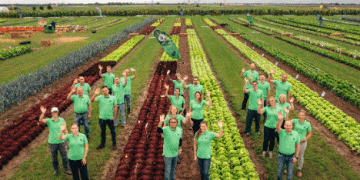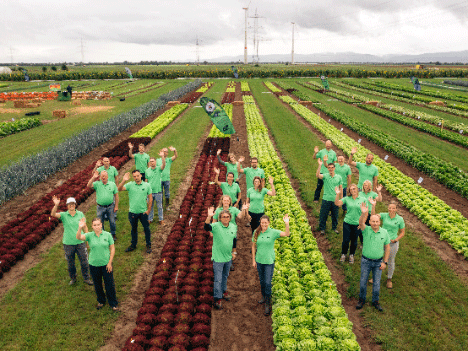Enza Zaden’s annual Field Days 2024 event brought together farmers, agronomists, and agricultural scientists to explore innovations in vegetable breeding. This year’s showcase emphasized the increasing need for disease-resistant crops, with a special focus on Bremia-resistant lettuces. As pathogens continue to evolve rapidly, resistant varieties have become indispensable for securing crop yields and maintaining farm profitability.
Under the theme “Resistance Makes The Difference,” Enza Zaden spotlighted the critical importance of robust resistance in modern vegetable cultivation. The event featured over 250 vegetable varieties spread across 36 plots, with both well-established and new varieties on display. The highlight of the field days was Enza Zaden’s ongoing work in breeding high-resistance (HREZ) tomato varieties, particularly against ToBRFV (Tomato brown rugose fruit virus), a growing threat to global tomato production.
Disease Resistance in Lettuce: Tackling Bremia and Fusarium
Enza Zaden has made significant advancements in breeding lettuce varieties with full resistance to Bremia, a destructive pathogen affecting the European lettuce market. Andreas Gemmar, Enza Zaden’s sales advisor for Germany, highlighted key innovations in lettuce cultivation. For example, the Miniromana variety E01G.12325 has demonstrated consistently strong performance over the past two years, showcasing full Bremia resistance. This variety, along with Xanbera and Hajo, will be available in organic quality for the upcoming season.
In addition, Thibo (E01E.12397), a new iceberg lettuce variety, was presented as a strong option for spring and autumn cultivation. Its adaptability to challenging conditions and resistance to diseases make it a versatile choice for both fresh market and processing applications. The fast-growing red butterhead lettuce Miaka (E01D.31209) is another promising variety for early cultivation, offering uniform heads and high-quality yields throughout the growing season.
Expanding the Portfolio: Spinach, Radishes, Herbs, and Pumpkins
Enza Zaden’s focus on disease resistance extended beyond lettuce. In spinach, the new Escape F1 variety was introduced, boasting full resistance to downy mildew (Pe 1-20 HR), making it ideal for early and late-season cultivation. Escape F1’s rapid growth, dark leaf color, and thick, smooth leaves make it a standout choice for baby leaf production and winter cultivation.
In the radish segment, Kebella, a new variety designed for organic farming, was introduced. With high robustness, growth vigor, and uniformity, Kebella is suitable for year-round outdoor cultivation and meets the growing demand for organic produce. Similarly, in the herb segment, the new parsley variety Tamino offers intermediate resistance to downy mildew and strong resilience against leaf diseases, making it ideal for both fresh market and industrial production.
Ivan Grgic, Enza Zaden’s area sales manager for Southeast Germany, showcased innovations in pumpkins, including the new organic Hokkaido variety Ker Madec F1 (E30R.00139). This variety exhibits strong intermediate resistance to potyviruses (ZYMV, WMV, PRSV), features a compact bush growth form for higher planting densities, and delivers exceptional flavor with a nutty-sweet taste.
Innovations in Brassicas and Fruit Vegetables
The brassica segment also saw exciting new developments. Enza Zaden introduced the cms-free kohlrabi hybrid Podia F1, ideal for organic cultivation throughout the entire outdoor season. Additionally, the new cauliflower hybrid Tessaury F1 (E40W.801) was designed for planting between weeks 14 and 29, offering strong growth, high health, and excellent head coverage.
In the fruit vegetable category, the focus remained on resistance. Enza Zaden continues to lead the charge in breeding tomato varieties with high resistance (HREZ) to ToBRFV, a serious threat in greenhouse vegetable production. New varieties resistant to CGMMV (Cucumber Green Mottle Mosaic Virus) and TSWV (Tomato Spotted Wilt Virus) in peppers were also showcased, addressing the growing challenges faced by greenhouse producers.
Enza Field Days 2024 emphasized the essential role of resistant vegetable varieties in ensuring the future of sustainable agriculture. With pathogens like Bremia, Fusarium, and various viruses rapidly evolving, the development of disease-resistant crops is vital to maintain food security and farm profitability. Enza Zaden’s ongoing efforts in breeding resistant varieties across a range of vegetables will be key to safeguarding crops in the face of mounting challenges.































